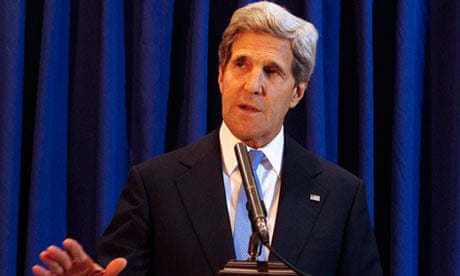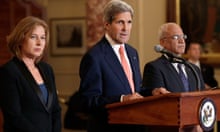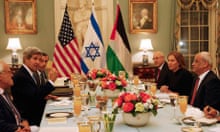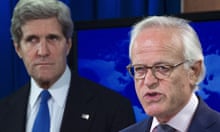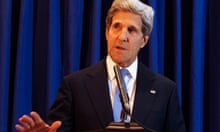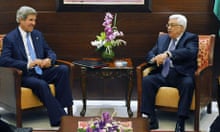The US is to host talks with Israel and Palestinian negotiators in the next week following a breakthrough in the drive to revive the moribund Middle East peace process
John Kerry, US secretary of state, called the move a "significant step forward".
The agreement, announced on Friday evening after four months of intensive diplomacy, fell short of a hoped for face-to-face meeting between leaders of the two sides.
Nevertheless, it is the first step in negotiations which could potentially lead to an eventual settlement of the 65-year conflict.
Kerry said he and the parties "reached an agreement that establishes a basis for direct final status negotiations". But he added that it was "still in the process of being formalised".
Both sides, wearied by decades of fruitless diplomacy, cautioned that an initial meeting – scheduled for the "next week or so" in Washington, according to Kerry – will not automatically lead to productive negotiations.
"There is a very, very long road ahead, and we may not get far down it," said one insider.
The key figures in the talks – Saeb Erekat for the Palestinians and Tzipi Livni for the Israelis – are veterans of the Middle East peace process, and will be extremely familiar with the positions held by their counterpart.
But dynamic engagement by the US administration, plus warnings that time is running out for a peace deal based on two states, could galvanise the long-term adversaries.
Details of the parameters for the talks were not disclosed by Kerry. At a press conference in Amman, Jordan – following a helicopter trip to Ramallah for a last-minute meeting with Palestinian president Mahmoud Abbas – Kerry warned against "conjecture" and said both sides had agreed that only he would make further comment on the process.
"The best way to give these negotiations a chance is to keep them private," he said.
"We know that the challenges require some very tough choices in the days ahead. Today, however, I am hopeful."
It is believed Kerry will press for the pre-1967 border, with agreed land swaps, to be the basis for negotiations over territory.
This has been a fundamental sticking point for the Palestinians, and is backed by most of the international community.
The Israeli prime minister, Binyamin Netanyahu, may also agree to release hundreds of Palestinian prisoners, including many who have served sentences of more than 20 years, over the coming months as part of the return-to-talks deal.
Kerry's announcement, made shortly before his plane departed Amman for Washington, followed a rollercoaster 24 hours in which hopes were raised, dashed, and raised again.
Statements by Kerry, Israeli president Shimon Peres and Arab League representatives on Wednesday and Thursday indicated that significant progress had been made.
But a meeting of the Palestinian Liberation Organisation executive on Thursday – described by insiders as stormy – initially rejected a return to talks amid serious concerns about the parameters for any negotiations and doubts about the commitment of the Israeli side.
Fears that Netanyahu could drag out any negotiations were fuelled by an unidentified Israeli government minister saying the prime minister's primary objective was merely to show willingness to negotiate, and that he did not intend to engage in a far-reaching peace process.
Intensive US diplomacy included a phone call from Barack Obama to Netanyahu on Thursday evening.
According to a White House statement, "the president encouraged prime minister Netanyahu to continue to work with secretary Kerry to resume negotiations with the Palestinians as soon as possible".
However, Netanyahu is facing pressure from rightwing coalition partners.
Naftali Bennett, leader of the pro-settler Jewish Home party, has threatened to walk out of the government if it agrees to talks on the basis on the 1967 border.
The party "will not be a partner, even for a second, in a government that agrees to negotiate on the basis of the 1967 lines", he wrote on Facebook.
This week's diplomacy was conducted against the backdrop of new EU guidelines, formally published on Friday, forbidding funding and grants to Israeli bodies with links to Jewish settlements across the 1967 line.
Amid furious Israeli reaction, Netanyahu launched a vigorous, but unsuccessful, bid to get the guidelines delayed or cancelled.
